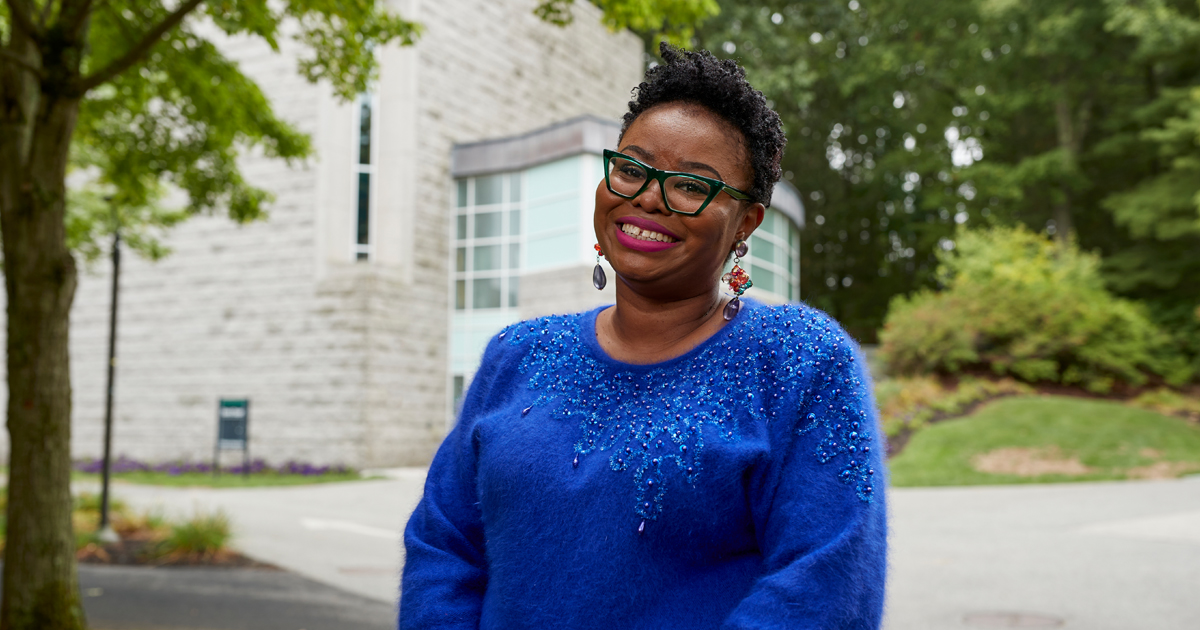Denicia Ratley: Supporting Students of All Faiths

During seminary, Denicia Ratley resisted taking a business ethics class, unconvinced it connected with her faith and spirituality. Ironically, she loved the course. So, after completing two master’s degrees at Gordon-Conwell Theological Seminary in Massachusetts, she joined Babson College in 2016, providing religious service and care for students, faculty, and staff at a top business school. As the director of Religious & Spiritual Life, Ratley oversees a team of four chaplains (Catholic, Jewish, Muslim, and Protestant), coordinates five student faith groups, and works directly with students of all faiths. “I really do feel like coming to Babson was divine,” she says.
The Q&A
What is the scope of your role and how does Religious & Spiritual Life support students?
“I help to provide safe space, and a healthy space, for students to learn who they are and cultivate and form their identity when it comes to spiritual and religious life. I wear so many hats, but I’m always focusing on what students need at that moment, but trying to also anticipate what they’re going to need in the future. That includes planning programming, creating spaces where there’s healing, and healthy ways to experience faith. That also includes partnering with dining services to accommodate students’ dietary needs, or connecting with Student Advising and faculty to accommodate student travel for religious holidays, such as Yom Kippur or Diwali, if they have to miss an exam or a number of classes. Or, it could be that a student stops me on my way to my office and needs support for something. I feel like I have to be ready for the unexpected and life interruptions. Whether it’s students in tears dealing with personal crises or in need of a little motivation and joy, my role can look one way today and another way tomorrow.”
How does Babson support students and community members of all faiths?
“There are so many different religious identities that we accommodate. How we do it here at Babson is we say, ‘All are welcome.’ Even if there’s not a formal student group, we will still support them. I’ve supported a student who wanted to travel to a Buddhist temple, students who needed a quiet space to perform rituals to their ancestors, and staff who needed grief support after a beloved colleague died. Community members also will use our space for meditation, and they aren’t necessarily a part of any particular faith. We also service students who aren’t religious at all, and they come and visit our weekly services like Muslim prayers, chapel service, Shabbat dinners, Breaking Bread, and Catholic Mass. So, although our weekly programs are identified with a specific faith, all are welcome.”
What is the reaction of Babson students to the services you provide?
“Students are very thankful, and they’re really sincere. In my office on campus, I have a thank you wall, where I have about 40 or 50 notes or cards from students writing out what I’ve meant to them, what our services have meant to them. I keep that in front of my desk to help remind me of the work that I’m doing. They do bring me to tears. One particular student told me, ‘I only chose Babson because when I visited here, and I met you all, I really felt like I could sustain my faith here. I felt like my faith would grow here.’ We don’t try to impose our religion or our beliefs on students, but we just invite them and we journey with them. However they want to come, we meet them where they are. And, that’s a good thing.”
“We’re giving students the ability to come into a safe space and share themselves and their beliefs without any type of judgment. The majority of the work we do supports DE&I because faith and religious practices are one of the most influential identities.”
Denicia Ratley, director, Religious & Spiritual Life
How does spiritual care and religious tolerance support the College’s objective to advance diversity, equity, and inclusion?
“We’re giving students the ability to come into a safe space and share themselves and their beliefs without any type of judgment. The majority of the work we do supports DE&I because faith and religious practices are one of the most influential identities. It influences what people think, how they believe, how they practice, how they behave, what they choose to do, who they choose to be around, who they choose to include or exclude. So, if we can catch them in these formative years, where they’re learning about themselves, we also can plant seeds of inclusion, which hopefully and prayerfully will lead to religious tolerance.”
How has spiritual care for students evolved over the years?
“This generation, and many generations, are looking for faith or religious practices or beliefs that are sustainable throughout life stages, but also ones that evolve. Students are thinking about life and existential questions. Am I really a good person, or does this really matter? Does this really count for something? Am I a good friend? Spiritually, students are looking for something deeper and something that’s sustainable, because I think during COVID, things were very shaky and uncertain. So, they’re looking for those things that are certain and sure. When it comes to my role and spiritual care work, it is no longer sitting behind a desk waiting for students to come to us, but it is innovative and taking initiative to go to students. We have to go out and be with the community, be a part of the community and relate to the community. Students are looking for authenticity and vulnerability. They also are looking at how you lead and treat people, and they notice how much you genuinely care. I think spiritual care has evolved into being as transparent as we want those whom we care for to be and to be learners and partakers just as much as we are teachers and givers.”
Two More for Denicia
What does Babson mean to you?
“Opportunity, growth, and learning. I say that personally because it has afforded me the opportunity to grow and learn. What they’re teaching—the ET&A, the Entrepreneurial Thought & Action—is actually what many of us do in our daily work. Babson has afforded me the opportunity to try things, make errors, and learn from them. So, let me think of a way that does work and let me be innovative. I think Babson definitely means growth for me. I come from more of a ministry church background, and I never thought that that work could translate into any other space. And, it does perfectly, and I think Babson has afforded me that option to grow and expand my spiritual rhythms and reach.”
What are you …
- Reading? “I am one of those readers that jump around, so I’m reading a lot right now. I’m reading The Sacred Slow by Alicia Britt Chole and The Awakened Brain by Lisa Miller. One of my favorite authors is Sue Monk Kidd, so I’m rereading The Dance of the Dissident Daughter. I’m also reading This Here Flesh by Cole Arthur Riley, and Fresh Peace by Jaiya John, and, of course, I read the Christian Bible.”
- Watching? “I love the BBC. And, I just watched ‘Murder in Provence,’ ‘Call the Midwife,’ and I binge on a few Netflix and Prime TV shows and movies.”
- Listening to? “I love jazz, so I listen to a lot of jazz—Esperanza Spaulding, Thelonious Monk, Dizzy Gillespie, Stan Getz, and Connie Han. I like sultry, as well, so I listen to Corinne Bailey Rae and Alabama Shakes. I also listen to Dr. Thema Bryant Davis; she has a podcast called ‘Homecoming,’ which I love and keep on repeat.”
- Doing in your free time? “I’m still settling into my new place, I’m painting things around the house and refurbishing and decorating. I love going to Barnes & Noble and looking through the record section, but I also go to a section I’m not interested in, like science fiction or poetry or biography, just to branch out and read different things.”
Posted in Community





